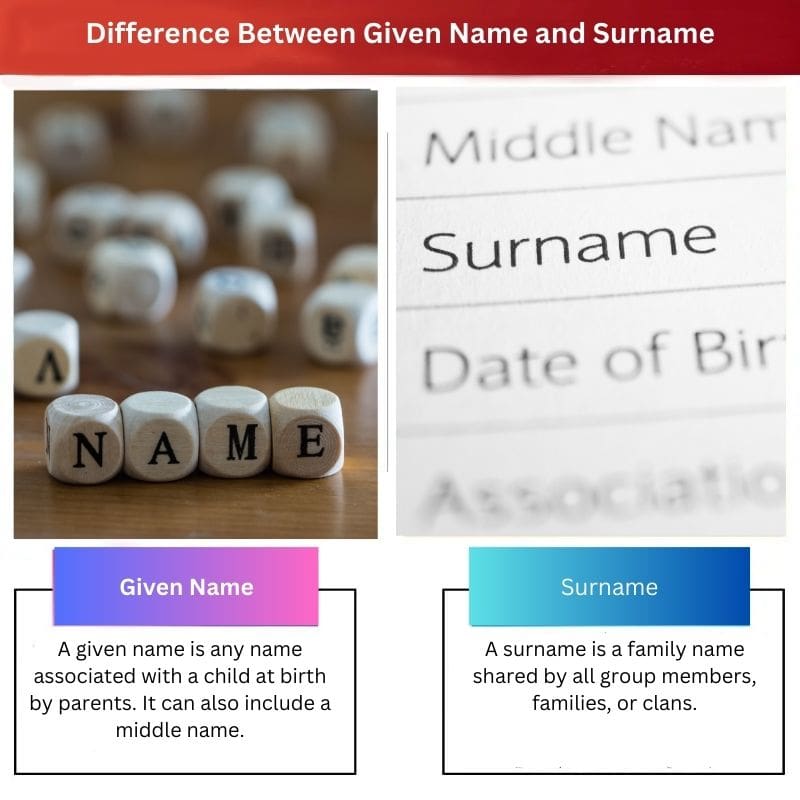Two of a person’s most critical and essential identification attributes are given name and surname. Depending on the country, culture, and tradition, given names and surnames can have different relevance and importance.
Key Takeaways
- A given name, or first name, is the personal name chosen by parents for their child, used to distinguish individuals within a family.
- A surname, also known as a last name or family name, is a shared name that identifies members of a family or lineage passed down through generations.
- Understanding the difference between given names and surnames is important for correctly addressing people, filling out forms, and navigating cultural naming conventions.
Given Name vs Surname
A given name is the personal name given to an individual at birth, used to identify them throughout their life. In some cultures, given names are known as first or Christian names. A surname, also known as a family name, is a name shared by family members. It is passed down from generation to generation and is used to identify a person’s family, ancestry, or heritage.

We face difficulties when we have to fill in various official forms that require differentiation between the given names and surnames to be made.
For example,
- Manish Malhotra has Surname: Malhotra and Given Name: Manish
- Ashish Malhotra has Surname: Malhotra and Given Name: Ashish
- Lara Jean Covey has Surname: Covey and Given Name: Lara Jean
Comparison Table
| Parameter of Comparison | Given Name | Surname |
|---|---|---|
| Definition | A given name is any name associated with a child at birth by parents. It can also include a middle name. | A surname is a family name shared by all group members, families, or clans. |
| Based on | The Given name is based on the parents’ personal choice at the birth of a child. However, it can be changed later. | A surname is always inherited. In most countries, surnames are derived from the surnames of fathers. |
| Importance | The given name is essential to differentiate between people with the same surnames. They are also necessary for individual identity. | Surnames are essential to tracing one’s origin and ancestry. |
| Usage | Given names are used in a friendly and familiar tone in the informal environment. They can also be used in formal settings when people with the same surnames have to be differentiated. | Surnames are used in formal settings to refer to seniors, associates, and colleagues. |
| Example | For example, 1)Maeve Wiley First name: Maeve 2) Ayushman Khurana First name: Ayushman 3) Karan Johar First Name: Karan | In the same examples, 1)Surname: Wiley 2) Surname: Khurana 3) Surname: Johar |
What is Given Name?
Also known as first name or forename, a given name is the personal name that distinguishes a person from the members of a group, family, or clan that share a common surname. It refers to the name associated with a child at birth, by parents.
The given name depends on the parents’ discretion at the birth of their child. However, children can change their names after they grow up.
Given names are most commonly used in informal settings and a familiar and friendly manner. They can sometimes be used in formal events when needed to differentiate between people of the same surnames.
For example,
- Maeve Wiley- Maeve is the first name.
- Kanika Kapoor- Kanika is the first name.
- Sanjay Leela Bhansali- Sanjay Leela is the first (with a middle name) name.

What is Surname?
A surname, also known as the last name or family name, refers to the part of one’s name derived from the family line. Depending on the culture, it is shared with all family members, clans, groups, or communities.
A surname is always inherited and shared with one’s immediate family members. In most countries, it is derived from the father at birth.
The surname is most commonly used on formal events and occasions unless people of the same surname have to be differentiated. It is essential to distinguish between people of the same given names.
More important is the power to trace our origin, family lineage, work our ancestors did, etc., Depending on the time and culture of various places.
For example,
- Maeve Wiley: Wiley is the surname.
- Kanika Kapoor: Kapoor is the surname.
- Sanjay Leela Bhansali: Bhansali is the surname.

Main Differences Between Given Name and Surname
- Given Name is a name that parents choose for their child at birth, while a surname is inherited by a child from his father in most countries and is shared by the entire group, family, and clan.
- Given Name is very important for an individual’s identity and distinguishing a person from others, while a surname is vital to trace one’s lineage, origin, and ancestry.
- Given Names are based on the discretion of one’s parents at the birth of their child, while surname is inherited from the family line.
- Given Names are used in informal settings to refer to friends and familiar people. In contrast, Surnames refer to people like colleagues, associates, collaborators, and managers in everyday settings. On a side note, given names can also be used in formal events when people with the same surnames must be distinguished.
Differences Between Given Names and Surnames
Cultural Perspectives
In various cultures, given names and surnames hold different levels of importance. Given names, or first names or forenames, are the personal names you receive at birth or assume later in life. They carry a cultural, familial, or religious significance, helping to identify you among your family members and reflecting characteristics your parents chose.
On the other hand, surnames, also known as family names or last names, connect you to your ancestry and family lineage. They derive from occupations, geographical locations, personal characteristics, or other determinants. While many Western cultures place the surname after the given name, other cultures, such as Hungary and Japan, position it before the given name.
Legal Aspects
From a legal standpoint, distinguishing between given names and surnames is essential when filling out official documents, applications, and forms. For example, when applying for passports, visas, or other identity documents, it is crucial to accurately provide your name and surname to avoid confusion or delays in processing.
Additionally, different countries and regions have specific laws and regulations regarding acquiring, registering, and altering given names and surnames. In some places, strict rules dictate the allowed characters, the number of names, or even the structure of names, to be registered at birth.
Remember to be mindful of cultural differences and legal requirements when providing or referring to given names and surnames, as it can significantly impact personal identification, official documents, and other important aspects of life.
Variations Across Countries
In this section, you will learn about the differences in naming conventions for given names and surnames across various countries. We will specifically focus on variations in Asian and Western countries.
Asian Countries
In many Asian countries, the given name-surname order varies from the Western norm. For instance, the surname comes first in China, followed by the given name. This is also the case in Hungary and Japan. However, some Asian countries like the Philippines and India follow the Western naming order.
It is also important to note that in countries like India, there are regional variations affecting name conventions. For example, names in the South include a patronymic component, while in the North, it is common to see surnames based on caste or profession.
Western Countries
In Western countries, the common naming convention is the first name followed by the middle name(s) and then the surname (or family name). For example, in United States, Canada, and most European countries, this is the standard format.
However, there are exceptions and regional variations within these countries. In Iceland, for example, surnames are patronymic, formed by adding the father’s name with a suffix denoting the child’s relationship to the father.
In Spain and many Hispanic cultures, individuals may have a composite surname, consisting of both the father and mother’s surnames. Additionally, in Portugal, it is common for the mother’s surname to appear before the father’s surname.
As the naming conventions across countries vary, you must be aware of these differences and adapt your understanding of given names and surnames based on the cultural context you are working with.
Changing Trends in Names
Effects of Globalization
As you may have noticed, globalization has had a significant impact on naming patterns around the world. New naming trends and traditions are emerging with increased cross-cultural and international interactions.
For example, people from different cultural backgrounds are now more likely to adopt names that are easier to pronounce and spell in their host country. This trend is evidenced by some immigrants changing their names to more “neutral” or locally familiar ones, as seen in a Swedish study where Slavic, Asian, or African names like Kovacevic and Mohammed were changed to names like Lindberg and Johnson. This simplifies communication and integration into the new society, making it easier for people to connect with others in the globalized world.
On the other hand, with the world becoming more interconnected, individuals are increasingly choosing names with unique cultural or historical significance to preserve their roots and heritage. So, you might see names from distant origins becoming more common as people share and appreciate the diversity of different cultures.
Impact of Pop Culture
Pop culture, too, has played a significant role in shaping naming trends in recent years. Movies, television shows, books, and even social media can influence the popularity of certain names. For instance, trendy names from popular fiction or movie characters can suddenly become widespread, as parents seek inspiration from the entertainment world.
In addition to drawing from pop culture, modern naming trends reflect the decline in traditional gender roles. It’s now common to see unisex or variations of names previously associated with one gender being used for the other gender. This shift highlights the society’s growing openness to challenging established norms and embracing more gender-neutral expressions.
As you can see, globalization and pop culture significantly impact the naming trends today. Names are personal identifiers and reflections of cultural, social, and generational shifts, making it essential to be aware of the changing landscape of naming traditions as you navigate life.
Role in Identity Formation
When it comes to your personal identity, both your given name and surname play significant roles in shaping your sense of self. Your given name, also known as your first name or forename, distinguishes you from other members of your family or group who share a common surname. This name is associated with you at birth and is chosen by your parents.
On the other hand, your surname, referred to as your family name or last name, connects you to your family lineage and heritage. Surnames carry cultural, geographic, or occupational meanings that can provide insight into your ancestors’ lives and histories. Together, your given name and surname form a unique personal identifier, helping establish your place in your family and the wider society.
Identity formation is a complex process involving the development of a clear, distinct personality that encompasses your self-concept, values, and sense of continuity. Your name plays a key role in this process, as it’s the first piece of information others use to recognize or know you. Additionally, the cultural and societal significance of names can influence how others perceive you and how you view yourself.
It’s worth noting that certain cultures place varying importance on given names and surnames. In some cultures, the given name holds more significance, as it’s used for personal identification, while the surname may be shared by numerous individuals within a community. In other cultures, the surname is more critical in emphasizing family ties, lineage, and even social standing.


It’s great to see such a detailed explanation of given names and surnames. Well researched!
The tone of the article is quite engaging, making it easy to grasp the matter.
I’m glad to find such a comprehensive article on this topic. Well done!
The comparison table is a nice addition. It provides a clear summary of the main differences.
Very informative and well-structured explanation. Thank you!
This post is really helpful in understanding the cultural importance of given names and surnames.
I appreciate the effort put into making the differences clear. It’s a great read!
This article cleared up my doubts regarding given names and surnames.
The explanation is quite complete, it helped me understand the difference between given name and surname.
The post has successfully highlighted the importance of given names and surnames.